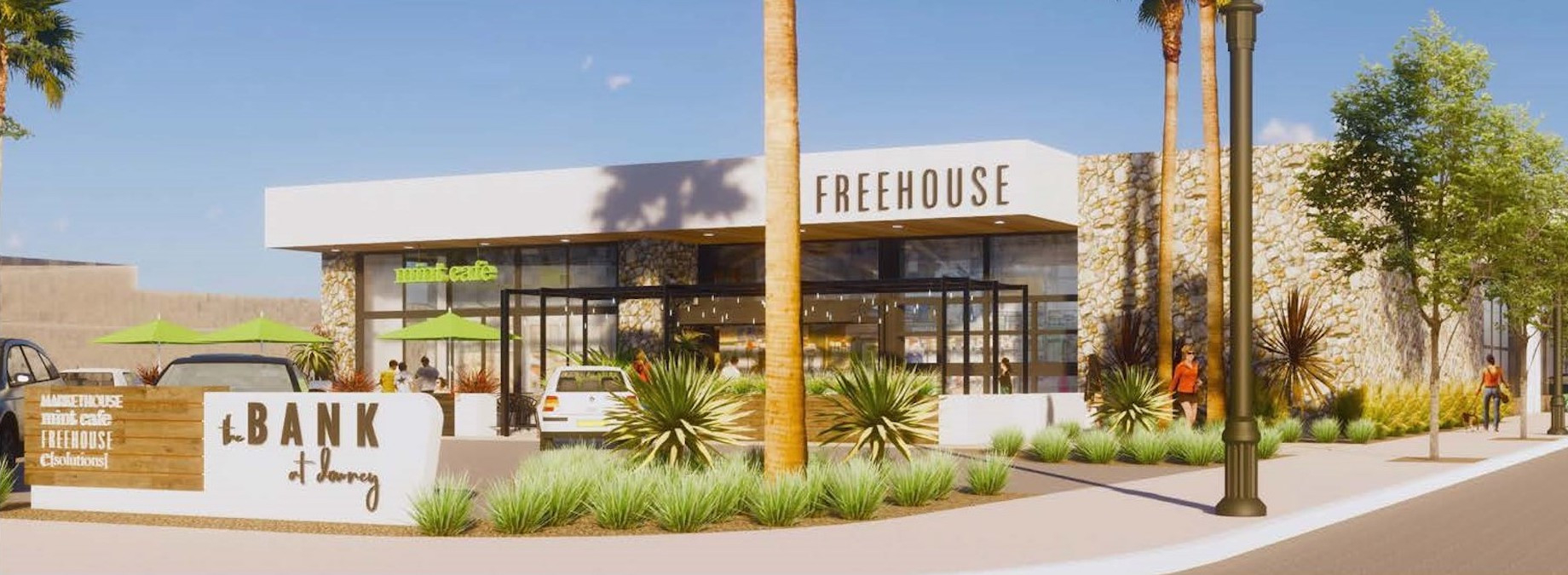When Alexis Suarez graduated from The University of Arizona in 2005 with dual degrees in business administration and Spanish, she wasn’t sure what she wanted to do career-wise. She worked for a time for her parents’ import/export logistics business, and she started studying for the LSAT. Then, around 2008, a friend who worked for a boutique developer suggested she try commercial real estate.

“You love retail,” he reminded her, and his bosses were looking to hire people fluent in Spanish. Suarez is the daughter of Mexican immigrants, and Spanish is her first language. She met with leadership at Arizona Partners, a commercial real estate firm based in Scottsdale, and they hired her to lease the shopping centers they owned in Latino neighborhoods.
Suarez, now the owner of her own successful real estate firm, ASÍ Real Estate Investments, prides herself on her competitiveness and asked her new bosses: “When do you think I’ll see my first commission?” When they responded that the typical minimum was six months, she thought: “There’s no way I’m going to wait six months! I’m going to set a record here.” She pounded the pavement, handing out flyers to owners of retail stores at shopping centers and cold-calling names she found in the phone book. Nonetheless, her first commission, landing a local retail clothing store for one of Arizona Partners’ properties, came exactly six months later. “I actually just interviewed someone and told them that exact story when they asked how long their first commission would take,” said Suarez. She laughed recounting that she could tell she didn’t believe her, just as she didn’t believe her bosses at Arizona Partners.
Despite the turnaround time, Suarez loved the hustle of the job. As someone who jokes that her real degree was in partying, she liked the social aspect of commercial real estate — “talking to tenants, engaging with the brokerage community” — and she loves helping people fulfill their dreams of opening up their businesses. Suarez was also attracted to commercial real estate’s growth opportunities. “There’s a limitless opportunity to grow and, frankly, make money,” Suarez said. “I think women don’t ever talk about that, but I was definitely motivated by financial success.”
And in real estate, she saw a niche that wasn’t being filled: elevated retail development targeted to the Latino community. It angers her that a stereotype still exists that Latino equals poor, she said. Latinos, she knew, were the fastest-growing minority in the U.S. As a group, she said, they are driven and entrepreneurial. According to a 2021 report by McKinsey, in the U.S., Latinos have the highest rate of entrepreneurship of any race, as the number of Latino-owned businesses has grown 12.5% over the past five years, compared with 5.3% for white-owned businesses.
Latino communities have a lot of overlooked purchasing power, Suarez believed then and still believes today, but because of the way demographic and forecasting tools work and because of some prejudicial attitudes, retailers and shopping center developers don’t always see the potential for the Latino community. Surveying the food and retail deserts in markets she worked in early in her real estate career, she saw fellow Latinos start to “almost feel like we don’t deserve any better.” Suarez vowed to do better.
In fact, this belief in the potential of the Latino market became part of her calling card. That’s in a real estate career that started with leasing spaces to mainly mom-and-pop stores for Arizona Partners in 2009 and evolved to representing and developing national brands like Yum Brand’s Habit Burger Grill and Chipotle and international brands like Caffenio and Charly and to closing two major shopping center development transactions in 2012 and 2014. The next year, she launched her own full-service real estate company, which now has offices in Los Angeles and Scottsdale. Suarez estimated that more than 60% of the work she and her firm do is conducted in Spanish.
Latino Heritage
Around 2010, Suarez had the idea to recruit retailers to Arizona Partners’ properties from Mexico City. “I thought: ‘We have such a huge Mexican community here. Why don’t we bring tenants from Mexico because there’s that brand recognition and nostalgia and bring them into our shopping centers?’” she said.
So she sought them out. While attending ICSC’s RECon Latin America conference and networking with retailers, she told an ICSC employee: “We should do something like this [in the U.S.] where we educate retailers, brokers and developers on the Latino community.” It turned out such an engagement strategy was already in the works, and Suarez became the Arizona chair of ICSC’s Hispanic Initiative. She helped organize conferences nationally and locally, introducing ICSC members to topics like opportunities to capitalize on the Latino market and marketing to the Latino market.
And the connections Suarez made through ICSC’s Hispanic Initiative helped her make career inroads, as well. As a direct result of her work with ICSC, for instance, Suarez connected with the director of real estate for Melrose, a San Antonio-based clothing retailer focused on Hispanic consumers. Melrose was impressed with her insider knowledge and tapped her to be its tenant rep, the first time she was engaged on the tenant side.
Despite her inexperience, Suarez got Melrose into some high-profile centers, including in the Desert Sky trade area, one of the top destinations in Phoenix for Latino consumers. Negotiations were not easy; Melrose’s rent terms were “not the friendliest,” Suarez recalled, and it didn’t “pay big rent.” Desert Sky was a place in which she knew Melrose would do well. “Trying to bridge that communication between the landlord and the tenant was a challenge, but that’s what you do,” Suarez said.
Inherent Entrepreneur
Suarez always had an eye toward opening her own business. During her time as a leasing rep at Arizona Partners, she made an effort to learn the acquisition and underwriting side and the development side of the business. She represented Primestor — a Los Angeles-based firm that focuses on underserved urban areas, particularly those within Latino communities — in the 2012 purchase of northern Phoenix’s 100,000-square-foot El Monte Shopping Plaza for $9.9 million and in the 2014 acquisition Phoenix’s 175,000-square-foot Palm Glen for $14.35 million. Those large commissions and the desire to go out on her own motivated her to take the leap and launch her own company. She started ASÍ Real Estate with a mission to go above and beyond in the service of her clients. At ASÍ, Suarez said, “we do the site selection, we do the lease review, we do the project management and even after tenants open, we don’t walk away.”
ASÍ represents many high-end health and wellness brands like retail health food chain Earthbar and a Scottsdale beauty bar called Beauty and Propaganda, but creating elevated Latino retail destinations also remains an important part of her business. Despite inroads, she still comes up against Latino stereotypes. For instance, ASÍ owns and is redeveloping The Bank at Downey, 13,000-square-foot, multitenant project in Downey, California, which Suarez described as a “very successful sales trade area.” She added: “The tenants are crushing it,” and the Los Angeles Times and The New York Times have referred to Downey “the Mexican Beverly Hills.” Still, Suarez said, rolling her eyes: “It’s Latino, so we’re poor.”

ASÍ Real Estate Investments owns and is redeveloping California’s The Bank at Downey, a 13,000-square-foot, multi-tenant property. ASÍ founder Alexis Suarez held off on leasing in order to land the higher-class tenants she knew Downey could support, and now she’s negotiating with a higher-end food retailer to open next year.
Suarez has waited on leasing for this project for a few years, trying to bring in higher-class tenants to accommodate a community she knows can support it. Within five miles of the project are 805,919 people with an average household Income of $65,000. ASÍ passed on many leasing opportunities that just didn’t fit what Suarez was looking for. “We said: ‘We’re not doing fast-food,” she noted. On the other hand, “95% of the cooler, higher-quality tenants that we see on the Westside of L.A. said no when [we approached them], even though we have higher density and higher income than some of their existing stores.”
Suarez described it as one of her biggest accomplishments that she is now in lease negotiations with a desirable, higher-end food retailer of the kind she always has known would fit in to Downey. She can’t say more about the tenant or how much space it would take, only that it would deliver next year. This is the work that makes her proud and is part of the reason she went into the business in the first place. “Once this project has [finished], it’s going to be a really big achievement,” she said.
Her doggedness has attracted like-minded clients. One of the retailers she represents, for instance, is Pressed Roots, a silk blowout bar started by Piersten Gaines, a Harvard Business School graduate who felt the hair care industry excluded ethnic hair. “In my opinion, it’s going to be the next dry bar for texturized hair,” Suarez said.

Pressed Roots, a blowout bar for textured hair, has faced some “racial stereotypes” trying to get into higher-end shopping centers, said ASÍ Real Estate Investments founder Alexis Suarez, who is the startup’s tenant rep. However, the salon now has locations in three higher-end Dallas properties and is working on three in Houston.
But in the same way that Suarez came up against Latino stereotypes, the startup salon has faced “some racial boundaries” trying to get into higher-end centers, she said. “It’s been challenging, and we’ve been working through overcoming these issues.” With Suarez’s help, Pressed Roots is now in three higher-end locations in Dallas and is working on three more in Houston. “Alexis recognized pretty early on what my business was,” Gaines said. “She understood what types of places would work and what wouldn’t work. And then beyond her knowledge, she just fights really hard for me. When it comes to negotiation, when it comes to the landlord, she just always has my back, fighting for me. I just really trust her a lot.”
People are naturally attracted to Suarez’s savvy and drive. Young, minority professionals often ask her for advice on how to succeed. Suarez tells them to “own” their backgrounds and be confident in who they are and what they have to offer. “Being a minority is a strength that can be very much in your favor,” she explained. “Part of the reason ASÍ has been so successful with the clients that we work with is that we understand cultural nuances.”
And, as Suarez often reminds her mentees, “the fact that I speak Spanish and am Mexican is the reason I'm in this business.” She wears her roots proudly: “I’ve never, ever had any shame in being Mexican. I always say that I’m Mexican loud and proud.”
In the future, Suarez hopes to expand ASÍ to more cities and to be the go-to for Latin American retailers looking to come to the U.S. She’s also working hard to recruit other underrepresented voices to the commercial real estate industry. At ASÍ, for instance, she structures brokers’ fees differently, offering a salary, plus commission, when starting. Suarez explained: “If you don’t have a trust fund and you don’t have a way to make money for 18 months, that automatically excludes you from our industry on the brokerage side.” She also is a board member of REAL, the Real Estate Association of Latinx Professionals, a group of real estate professionals intent on improving access to capital and inclusivity for the Latino community. Her goal is to make the industry more inclusive with real estate professionals that better represent the community they’re working in. “Part of my mission,” she said, “is to change the face of real estate.”
By Rebecca Meiser
Contributor, Commerce + Communities Today and Small Business Center